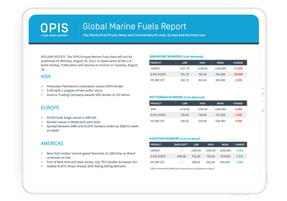The European Commission is set adopt a new marine fuel proposal, called the FuelEU Maritime initiative, as part of a package to bring the sector in line with the European Union’s carbon-neutral goal by 2050, according to the EU Commissioner for Transport, Adina Vӓlean Thursday.
As renewable low-carbon fuels will need to represent approximately 90% of the maritime fuel mix by 2050, Europe will lead with the first legislative marine fuel initiative of its kind, said Vӓlean at a press conference focusing on the launch of the energy pillar of the new EU climate laws.
“We are front-runners, and this will unlock investments towards decarbonization,” Vӓlean explained.
Ship traffic to or from ports in the European Economic Area accounts for some 11% of all EU carbon dioxide (CO2) emissions from transport and as much as 4% of total EU CO2 emissions, according to the European Commission. The FuelEU Maritime initiative aims to push demand and deployment of renewable alternative fuels for ships above a 5,000-gross tonnage level. Furthermore, it forces polluting ships to switch to onshore zero-emission technologies in ports and coastal areas.
The European Commission has unveiled its long-awaited 'Fit for 55' climate policy proposals that seek to transform economic life across the European Union in the most radical attempt in history by a major economy to bend the arc of its future carbon emissions and achieve net zero emissions by 2050.
The measures announced July 14 by the executive arm of the 27-member bloc aim to slash its carbon emissions by 55% by 2030 compared to 1990 levels. They involve strengthening the cap-and-trade EU Emissions Trading System (ETS), introducing a levy on carbon-intensive imports and forcing companies in several industrial sectors that have proved difficult to decarbonize to pay for the full costs of all their emissions by the mid-2030s.
However, the European Community Shipowners' Associations (ECSA) have expressed concern over the lack of detail around liability and global standards around the FuelEU Maritime initiative.
“Shipowners will now become liable for the greenhouse gas (GHG) content of the fuels they buy, and not the fuel supplier, and this raises serious questions,” ECSA secretary-general Martin Dorsman told OPIS.
“If a shipowner bunkers fuel oil outside the EU and on paper the fuel meets the EU requirements, what guarantee is there that the fuel is indeed of EU quality?” Dorsman added. “The EU doesn’t want first generation biofuels but how can we make sure that biofuels bunkered outside the EU are not of the first generation? We will need to be sure that we have the same standards on quality applied globally.”
Nevertheless, the EU proposes to gradually add shipping to the bloc’s carbon market between 2023 and 2025, ensuring full compliance with pollution caps by 2026. Danish integrated shipping company A.P. Møller – Mærsk said the first step should be dealing with intra-European trade before seeking a global answer to the problem of GHG emissions.
“We worry that imposing emission trading scheme (ETS) obligations outside of EU waters will undermine the EU’s ability to remain a trusted partner for international organizations such as the International Maritime Organization,” a Maersk spokesperson told OPIS. “We still need the EU to secure a global solution to shipping’s greenhouse gas emissions. The ETS must not become a sleeping pill in international negotiations,” they said.
Shipping representatives also advocate for a dedicated fund to be set up under the emission trading system.
“These emissions-generated revenues are needed to support the sector’s R&D efforts and its energy transition by improving the business case for alternative fuels, making the switch more feasible for shipowners,” ECSA told OPIS.
Still, questions remain over to what extent the proposed EU fuel initiative will simply drive uptake of liquified natural gas (LNG) and biofuel bunkering, rather than stimulating the shift to lower greenhouse gas options like green ammonia and methanol, according to bunker sources.
Citigroup chairman of global logistics, shipping and offshore Michael Parker said in June the cost of financing decarbonizing the global shipping industry would total $2 trillion.
--Reporting by Benita Dreesen, benita.dreesen@ihsmarkit.com
--Editing by Rob Sheridan, rob.sheridan@ihsmarkit.com
Copyright, Oil Price Information Service
The OPIS Global Carbon Offsets Report is the world's first voluntary carbon markets price report, meeting the demand for price discovery and transparency across the industry. It provides daily physical assessments for 27 voluntary carbon offset credits and 10 compliance carbon offset credits, including REDD+, CORSIA Eligible Offsets, and California Carbon Offsets. Breaking news coverage and analysis reveals trends and fundamentals impacting global voluntary carbon market supply and demand.


